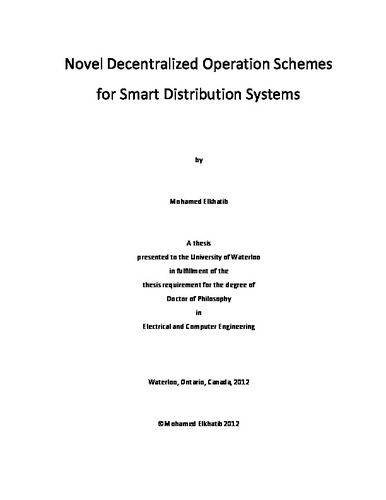| dc.description.abstract | Recently, there have been many initiatives to incorporate advanced controls, two way communications, digital technologies and advanced power system components in the operation and control of power distribution systems. These initiatives are aiming to realize what becomes known as the “Smart grid”. It is expected that a Smart Grid will lead to enhancement in the reliability and efficiency of the power system. The movement towards the Smart Grid is motivated by many factors; the need to integrate more renewable power to mitigate the global warming, the increasing interest in connecting more distributed generation (DG) as a way to postpone large investment in transmission and bulk generation, and the need to increase the reliability of the power system overall to minimize disturbance costs.
It is the overall goal of this research to introduce novel distribution system operation techniques to assist in the effort of realizing the “Smart Distribution System” in both normal and system restoration modes. In particular, three main operation functions are dealt with in this research work; Voltage Control, Reactive Power Control and Distribution System Restoration.
First for Voltage Control, a reliable and efficient method is proposed to control voltage regulators in order to enable the regulation of multiple feeders with diversified loads using only one regulator provided that no DG is connected to the feeders. Regulator’s tap is selected based on the solution of an integer linear optimization problem. The method has a closed form solution for the optimal tap; that is valuable for real time operation. In addition, necessary condition for feasible solutions is examined.
Next, a novel coordinated voltage control scheme is proposed to enable the voltage regulator to efficiently regulate the voltage of multiple feeders in the presence of DGs. The proposed technique is based on placing a Remote Terminal Unit (RTUs) at each DG and each line capacitor. These RTUs coordinate together, through communication, and form a multi-agent system. An important contribution of this research is that the proposed scheme provides the minimum hardware requirement to efficiently estimate the voltage profile of a feeder with DGs. The proposed scheme enables the integration of more DGs into the system by, efficiently, coordinating the operation of voltage regulators and DGs to mitigate voltage rise problem caused by the connection of DGs to the system.
Second, for Reactive Power Control, a decentralized reactive power control scheme is proposed to optimally control switched shunt capacitors of the system in order to minimize system losses and maintain acceptable voltage profile. The proposed algorithm provides capacitors with “Advanced Voltage Sensing” capability to enable capacitors to switch in and out according to the global minimum and maximum voltage of the feeder. The proposed technique utilizes the same RTU used for voltage control and relies on the voltage profile estimation technique proposed in this research for the coordinated voltage control. In addition, novel decentralized algorithm is proposed to estimate the feeder voltage profile change as a result of injecting reactive power at the capacitor bus. The proposed reactive power control scheme can be used to coordinate the operation of any number of capacitors connected to the distribution system.
Combining voltage control and reactive power control schemes, generalized coordinated voltage control is proposed to coordinate between DGs, shunt capacitors and voltage regulators in order to achieve optimal voltage control for the distribution system and solve the steady state voltage rise problem caused by the connection of DGs, hence, allowing more DGs to be connected to the system.
Over and above, the proposed generalized coordinated voltage control enables the realization of a new operation-time DG connection impact assessment concept. Based on this concept, the system will carry out a real-time assessment and decide, based on the available control actions, the maximum DG power that can be allowed to connect to the system at particular operating conditions. This new concept will allow great flexibility to the connection of DGs, most notably, when, due to a change in system configuration, the DG is needed to be connected to a feeder other than the one it was planned for during the planning stage.
The last operation function dealt with in this research work is the distribution system restoration. Novel decentralized distribution system restoration scheme is proposed. The proposed scheme is based on dividing the distribution system into zones based on the availability of disconnecting switches. Each zone is controlled by an Agent. The restoration is done based on the coordination between these Agents. Proposed communication protocols between Agents are discussed in details. The goal of the proposed restoration scheme is to maximize the restored power while preserving the radial structure of the distribution system and without exceeding the thermal limit of any equipment in the system. As the proposed technique does not assume any supervision from any central point, this technique will enable the realization of a self-healing distribution system restoration. | en |

